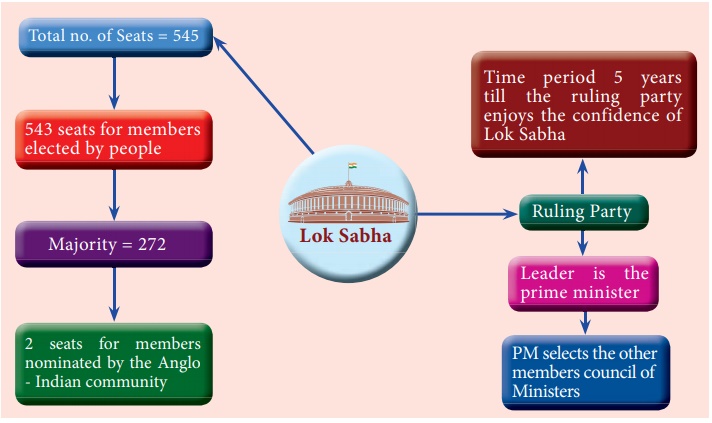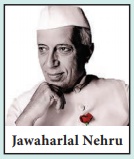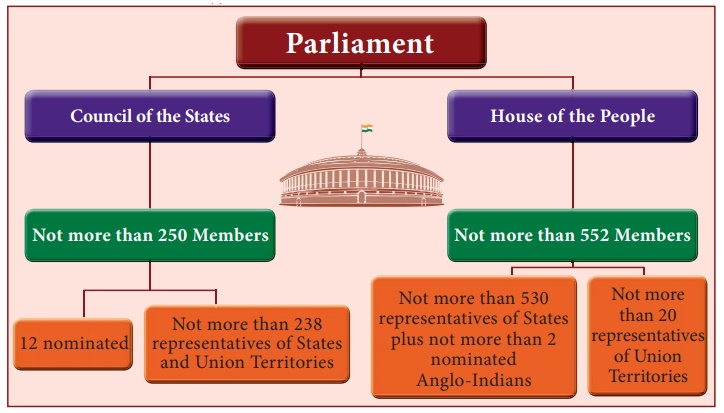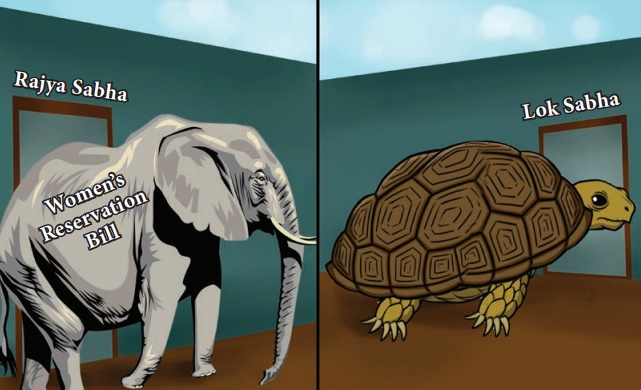Political Science - Union Legislature: The Parliament | 12th Political Science : Chapter 2 : Legislature
Chapter: 12th Political Science : Chapter 2 : Legislature
Union Legislature: The Parliament
Union Legislature: The Parliament
The Parliament is known as Union Legislature or
National Legislature, which is a supreme body of decision making and symbol of
democratic governance. The Parliament is the most powerful platform with
accountability for debating on the issues regarding welfare of the country and
its people and enacting laws and making changes to the constitution.
When the Parliament meet for
discussing various agenda and approving bills, motions with a scheduled meeting
is called Session. The Parliament holds THREE sessions in a year.
1. Budget session (February-May)
2. Monsoon Session (July-August)
3. Winter Session (November-December
It has two important powers and functions called as
legislative and financial. The legislative powers are for law making and the
financial powers are to prepare money bill as called as budget. Also the
parliament has electoral functions with regard to elect the President and the
Vice-President of India.
The Parliament has judicial function also on the
matters of the proposals for the removal of the President, Vice – President,
Judges of the Supreme Court and High Courts and the process of removal is
called ‘impeachment’. It is the duty of the President to summon the Parliament
and it must have not less than two sessions in a year. Every year, at the
commencement of the first session of the parliament, the President delivers his
special address which would be the future course of action of the parliament in
view of giving framework for new policies, programmes and initiatives of the
government. The parliament of India has functions of legislation, overseeing of
administration, passing of the budget, ventilation of public
grievances, and discussing national policies and issues of concern. The
cabinet, both individually and collectively is accountable to and removable by
the Loksabha.
Functioning of House of People (Lok Sabha)
The parliament has two houses and both houses carry
the same values and responsibilities with a few exception such as passing the
finance bills. The first one is the Lok Sabha (Lower House or House of People)
with 543 members elected from 543 Parliamentary constituencies across the
country directly by the people who have attained the age of 18 and above and
registered as voters. The Lok Sabha has 2 nominated members from the
Anglo-Indian community.
Quorum of the House: One tenth of the total number of members of Lok Sabha /
Rajya Sabha constitutes the quorum for a meeting of the House.

The grand total number of members in the Lok Sabha
is 545, but the nominated members cannot decide the government when it proves
majority on the floor of the House. The Lok Sabha is the highest forum for
discussion, debate on public issues, interest and policies to cater to the
socio-economic needs of the people.
The members of both houses are generally called by
the public as Member of Parliament. Member of Parliament, Lok sabha is one who
represents the constituency of the state, comprising of six Assembly
constituencies, directly elected by the people through elections. The term of
the Lok Sabha is for five years.
Roles and Responsibilities of the Speaker
The leader of the House of the People is the
Speaker – who is elected by the Lok Sabha, from among its members. The
Speaker’s duties are to conduct, facilitate the debates and discussions as well
as the answers to questions, regulating the conduct of Members of the House and
taking care of their privileges and rights. The Speaker of Lok Sabha is the
administrative head of the parliamentary secretariat.
The Speaker also ensures that the members adhere to
the appropriate procedures, and to allow the members to raise question,
allotting time to speak and withdraw the objectionable remarks from record and
moving a motion of thanks to the President’s speech. The Speaker has the power
to expel the members if they flout or violate the norms and rules of the house.
The permission of the Speaker is required to move amendments to a bill. It is up to the Speaker to decide whether the bill has to be moved or not. The Speaker plays the role of guardian of the rights and privileges of the house, its various Committees such as consultative, select, advisory and of members of that Committees. Another important power of the Speaker is to refer any question of privilege to the Committee of privileges for examining, investigating and reporting. The questions raised by the members and answers, explanations and reports are addressed to the Speaker.
Jawaharlal Nehru, one of the chief architects of India and a driving force behind its democratic principles of the Constitution, placed the office
of the Speaker in India in the proper context when he said: “The Speaker
represents the House. He/she represents the dignity of the House, the freedom
of the House and because the House represents the nation, in a particular way,
the Speaker becomes a symbol of nation’s freedom and liberty. Therefore that
should be an honoured position, a free position and should be occupied always
by persons of outstanding ability and impartiality”.

The Speaker is the final authority to decide on the
question of point of order. Under the constitution, the Speaker enjoys special
provisions and certifies money bills. The Speaker of the House of the People
presides the joint sessions of the parliament in case a special occasions or in
the event of disagreement between the two houses on certain legislative
measures. The Speaker decides whether a Bill is a
Money Bill or not and his decision on this question is final. It is the Speaker
who decides on granting recognition to the Leader of Opposition in the House of
People. Under 52ⁿd Constitution Amendment, the Speaker
Council of the States (Rajya Sabha)

The Rajya Sabha or the Council of States is called
as upper house. It has a total number of 250 members including 238 from all the
states and union territories and 12 members nominated by the President. The
council of states Rajya Sabha is called as second chamber of the Parliament of
India. The Rajya Sabha is an institution to protect the rights and interests of
the states like the senate in USA. It was constituted on 3rd April, 1952.
The members for Rajya Sabha are elected by the
members of the respective State Legislative Assemblies (MLAs). Apart from the
members of the states, twelve distinguished members from the has the
disciplinary power to disqualify a member of the house on the grounds of
defection. Even though, the Speaker also one of the members of the House and
holds neutral, does not vote in the house except rare occasions when there is a
tie at the end of the decision. fields of literature, science, art, and social
service were nominated by the President of India. Unlike House of People,
Council of States is not subject to dissolution but one third of the members
retire every second year. The term of the individual member is six years. The
members of the Council of States are elected by their respective state
legislative assemblies in accordance with the system of proportional
representation by means of the single transferable vote.
Functioning of Rajya Sabha
The Vice-President of India is the ex-officio
Chairman of the Rajya Sabha. The Chairman presides over the proceedings and
regulates the Rajya Sabha. Except the Money/Financial Bill all other bills will
be placed before the Rajya Sabha for discussion, questions, motions and
resolutions under the rules of procedure and conduct of business. The functions
of Rajya Sabha may broadly be categorised as: Legislative, Financial,
Deliberative and Federal. Legislation is by far the most important business of
Rajya Sabha, as indeed of Parliament and in this sphere, Rajya Sabha enjoys
almost equal powers with Lok Sabha. In the U.S.A, the representatives in the
state council is called as Senate where every state has equal representation
irrespective of size and population of the states. But in India, the
representation in the Rajya Sabha is based on its size of population.
For example, Uttar Pradesh with the highest
population elects 31 members to Rajya Sabha; on the other hand, Sikkim, the
least populated state, elects only one member to Rajya Sabha. Tamil Nadu elects
18 members to the Rajya Sabha. The number of members to be elected from each
State has been fixed by the fourth schedule of the Constitution. Members of the
Rajya Sabha are elected for a term of six years and then they can be
re-elected. The Rajya Sabha is known as Permanent House of the Parliament that
never gets fully dissolved. Some of the important privileges and immunities are
given to the Members of Rajya Sabha as follows.
Who can be a Member of Rajya Sabha?
v Must be a citizen of India
v Must not be less than 30 years
v Under the Representation of the People Act, 1951, a person had to be an elector in a
parliamentary constituency in the State from where he seeks election to Rajya
Sabha.
v It may, however, be mentioned that the Representation of the People (Amendment) Act, 2003,
which amended Section 3 of the Representation of the People Act, 1951, has done
away with the requirement of being a resident of State or Union territory from
which a person seeks to contest elections to Rajya Sabha.
v He/She has to be an elector in a parliamentary constituency anywhere in India.
Activity
- Interpretation of Cartoon
Women members in
the Rajya Sabha urged the Government to ensure the passage of the Women’s
Reservation Bill in the Lok Sabha. The Bill, which proposes 33% reservation for
women in Parliament and State legislatures, was passed by the Rajya Sabha in
2010 but has been stuck in the lower house for nine years.
The Constitution
(108th Amendment) Bill, commonly known as the Women’s Reservation Bill, needs
to be approved by the Lok Sabha in order to become law.

Cartoon Courtesy : The Hindu, 13.3.2010.
As a class, discuss
what you already know or think about the following topics:
a. Women’s Reservation
Bill
b. 33% quota
c. Needs to be
approved by the Lok Sabha
Activity
Think-Pair-Share
Topic : Which House is considered to be more powerful the Lok Sabha or
the Rajya Sabha?
Task : Student should think individually for a few minutes, and then
discuss and compare their responses
with a partner before sharing with the entire class.
Preparing students
to participate more fully and effectively in whole class discussions.
Powers and Privileges of Members of Parliament
1. Freedom of speech in Parliament
and immunity of a member from any proceedings in any court in respect of
anything said or any vote given by him in parliament or any Committee thereof.
2. Immunity to a person from
proceedings in any court in respect of the publication by under the authority
of either House of Parliament of any report, paper, votes or proceedings.
3. Prohibition on the court to
inquire into proceedings of parliament.
4. Immunity to a person from
proceedings in any court in respect of the publication in Newspaper of a
substantially true report of any proceedings of either House of Parliament
unless the publication is proved to have been made with malice.
5. Freedom from arrest of members in
civil cases during the continuance of the session of the House and forty days
before the commencement and forty days after its conclusion.
6. Exemption of a member from
service of legal process and arrest within the precincts of the House.
Source: https://www.india.gov.in/sites/upload_files/npi/files/coi_part_full.pdf
Related Topics